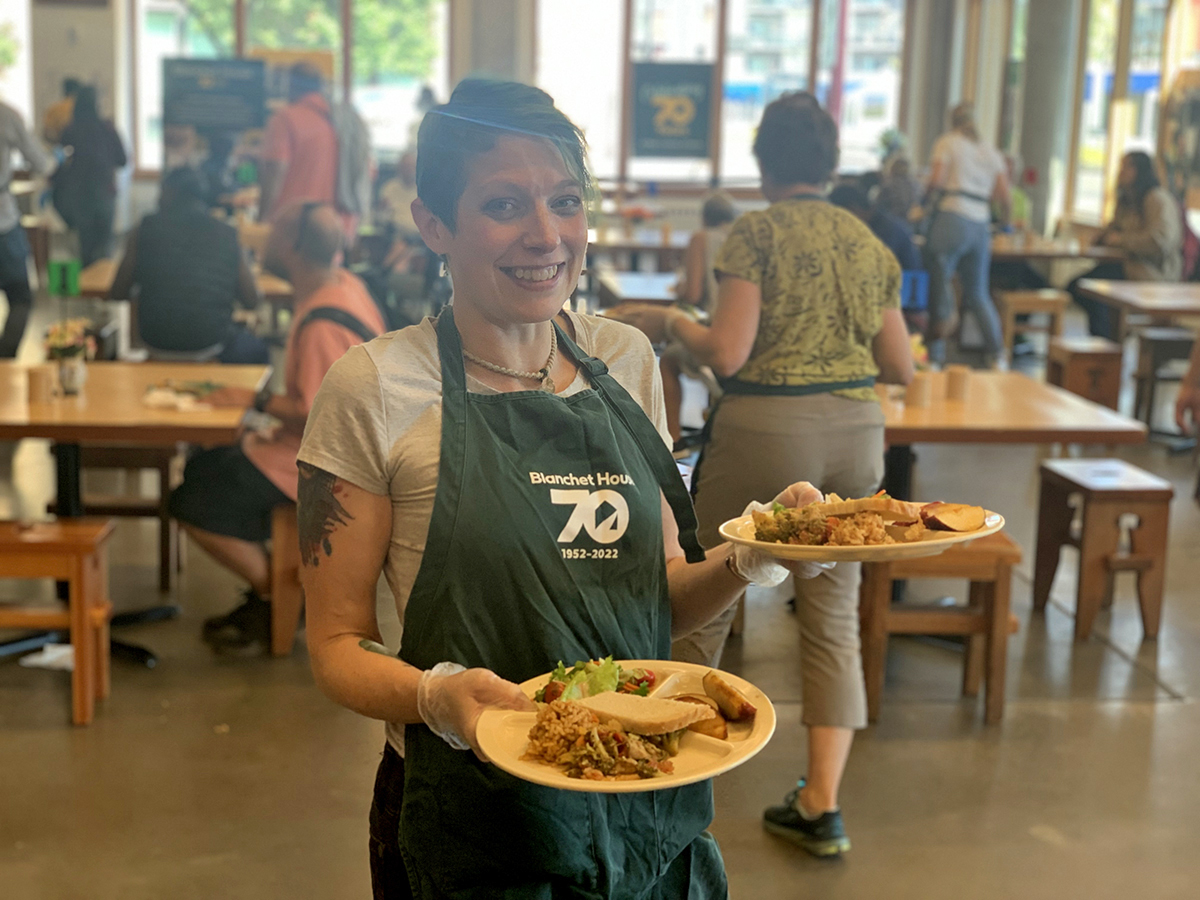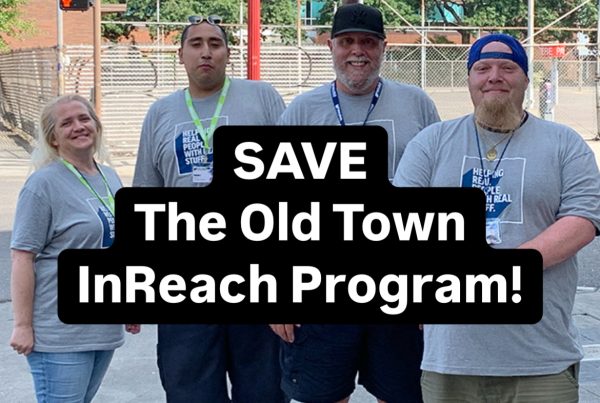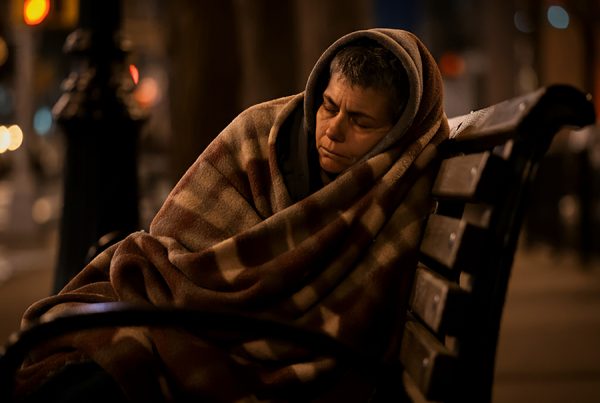As homelessness due to drug addiction becomes more visible in our cities there are many people who wonder if offering basic aid such as food, water, and clothing is enabling unhealthy behaviors. At Blanchet House of Hospitality, we believe it is a moral imperative to feed hungry, homeless people whether they suffer with drug addiction or other challenges. Compassion can open doors to recovery and a healthier future for all.
When discussing the issue of helping the poor and feeding the homeless, it is crucial to address the specific challenges faced by individuals grappling with drug addiction. At Blanchet House of Hospitality, it is our founding mission to extend compassion and aid to all marginalized people and this includes people who use drugs and alcohol. By offering support through nourishment, we not only address people’s immediate needs but also pave the way for a path to recovery and a chance at a better life.
We Feed Homeless People with Drug Addiction to …
1. Preserve Human Dignity
People struggling with drug addiction are often stigmatized and marginalized, facing isolation and judgment from society. However, it is essential to recognize that they are still deserving of basic human rights, including access to food, water, clothing, and a safe place to sleep. By inviting people in to enjoy meals in our free cafe, we acknowledge their inherent worth as individuals and uphold their right to dignity, regardless of their circumstances.
According to experts in substance abuse recovery, when people experiment with drugs for the first time, addiction is the last thing on their minds. Instead, they turn to these dangerous substances to fill a void. But a one-time event may turn into a life-long cycle that controls your mind and body.
We acknowledge that people addicted to substances are suffering. It is our mission at Blanchet House to alleviate suffering by offering to feed, clothe, and shelter those in need.
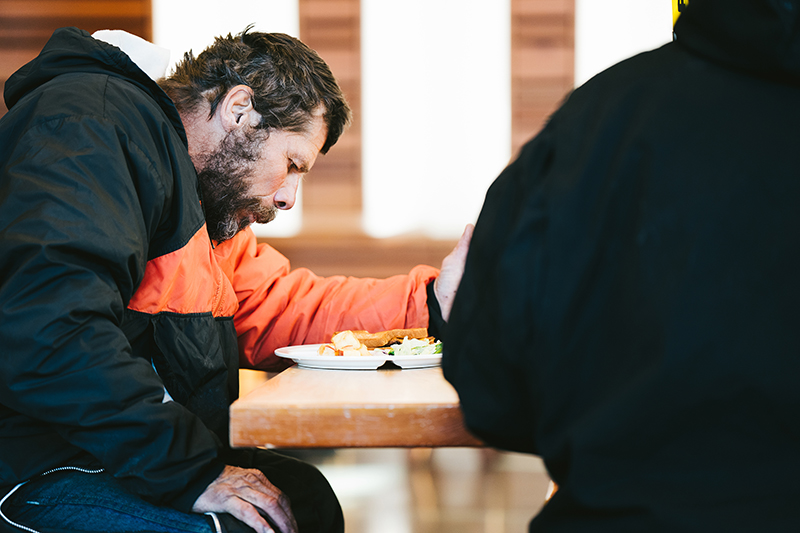
A man eats lunch in Blanchet House’s free cafe. Credit Christine Dong.
2. Foster a Holistic Approach to Recovery
Recovery from drug addiction is a complex and multifaceted journey that requires wraparound support. Proper nutrition plays a crucial role in aiding physical and mental well-being, and offering food can be an essential part of a holistic approach to recovery. Adequate nourishment not only helps individuals regain their strength but also promotes mental clarity and stability, creating a foundation for successful rehabilitation.
“One of my first little spiritual awakenings was when I promised Tony [a resident who works in Blanchet House’s free cafe] that I would be here for lunch. I dragged myself to the cafe even though I didn’t feel good,” says Diane Rigor, who’s in recovery from drug addiction and a Peer Support Specialist. “I didn’t want to disappoint Tony.”
Being expected to show up to eat gave Rigor the incentive to do so. That accountability was one of her first steps toward sobriety.
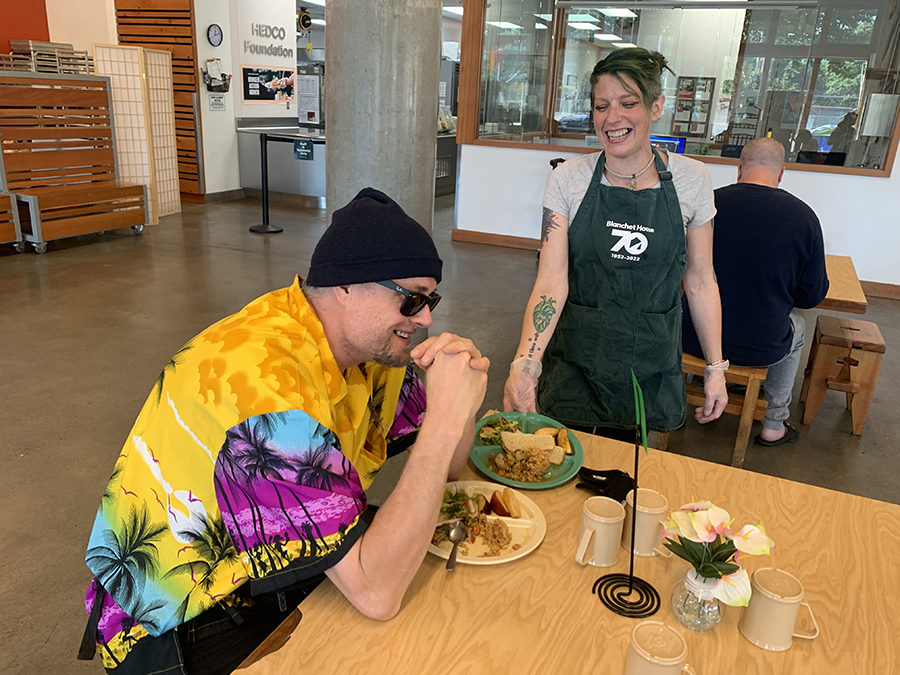
Diane laughs with a guest while she volunteers to serve lunch in Blanchet House’s cafe. Credit Julie Showers.
3. Build Trust and Encourage Treatment
When individuals with drug addiction are offered a safe place to rest, eat, and commune with others, it can help build trust between them and professionals wanting to help them. By extending a helping hand, we establish a foundation for communication and connection, making it more likely that individuals will seek and accept further assistance, including treatment options. Offering food becomes a gateway to fostering relationships and encouraging individuals to take steps toward recovery.
At Blanchet House, we employ Peer Support Specialists like Rigor who have overcome homelessness, drug addiction, and mental health challenges. They act as mentors and connectors to services like detox, medical care, and shelters.
“I needed to change multiple things at one time, which is really hard to come by unless you have something stable in your life,” Rigor recalls. “You just get caught in this trap of craving and loss and despair, and it’s so miserable. I feel like I can relate to the clients a little bit better than some people because I understand.”
4. Reduce Health Risks to Our Community
Homelessness and drug addiction often go hand in hand, leading to increased risks of public health issues such as the spread of infectious diseases. A lack of access to hygiene products, restrooms, showers, and laundry can cause infections. By providing meals and addressing the basic needs of individuals with drug addiction, we contribute to reducing these risks. Proper nutrition can help strengthen their immune systems and overall health, mitigating the potential impact on public health and fostering a safer environment for all.
“I found myself hiding in a shed covered in filth,” Rigor remembers. “I never thought I would be one of these people. I’m well educated. I have a lot of morals that I compromised in my active addiction.”
Assisting individuals with drug addiction and providing them with food serves not only their immediate needs but also holds long-term benefits for society. By helping them stabilize their lives and address their addiction, we reduce the strain on public resources, including emergency healthcare services and the criminal justice system. Moreover, as they reintegrate into society as productive individuals, they can contribute to the workforce and their communities, fostering economic growth and social cohesion.
5. Help Improve Lives and Society
When we discuss the imperative of helping the poor and feeding the homeless, it is vital to include individuals struggling with drug addiction. By extending compassion, support, and nourishment, we not only preserve their human dignity but also open doors to recovery and a brighter future. Addressing their immediate needs can create an environment conducive to trust, treatment, and rehabilitation. Ultimately, by offering assistance to people with drug addiction, we build a more compassionate and inclusive society, where everyone has an opportunity to heal, recover, and thrive.
This article was written with assistance from ChatGPT.














